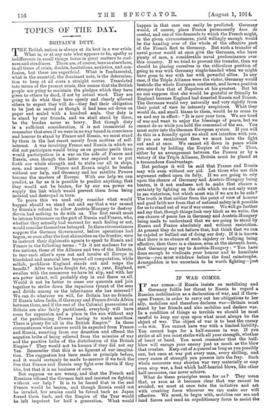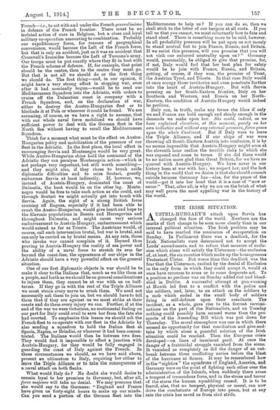IF WAR cos.ME I F war comes—if Russia insists on mobilizing
and Germany fulfils her threat to Russia to regard a Russian mobilization as a declaration of war, and if there- upon France, in order to carry out her obligations to her ally, mobilizes and therefore declares war—Britain must stand by her friends and also mobilize and declare war. In a condition of things so terrible we should be most careful to keep our eyes upon what must always be the object of war. The object of war is to beat the enemy —to win. You cannot have war with a limited liability. You cannot hope for a half-success in war. If you strike at all you must strike with all your strength, whether of heart or hand. You must remember that the half- blow will enrage your enemy just as much as the blow that crushes. Keep out of a quarrel as long as you possibly can, but once at war put every man, every shilling, and every ounce of strength you possess into the fray. Such whole measures may shorten war very materially or may even stop war, a feat which half-hearted blows, like other half-measures, can never achieve.
What do these principles mean for us ? They mean that, as soon as it becomes clear that war cannot be avoided, we must at once take the initiative and act with crushing force wherever we can make our will effective. We must, to begin with, mobilize our sea and land forces and send an expeditionary force to assist the French—i.e., to act with and under the French generalissimo in defence of the French frontier. There must be no isolated action of ours in Belgium, but a close and loyal military co-operation amounting to combination. Probably our expeditionary force, for reasons of geographical convenience, would become the Left of the French force, but that is only an accident, just as it was an accident that Cromwell's Ironsides became the Left of Turenne's army. Our troops must be put exactly where they fit in best with the French scheme of defence. If, for example, that point should be the centre, then to the centre they must go. But that is not all we should do or the first thing we should do. The first thing--and, in our opinion, it might have a very strong effect in stopping war, even after it had nominally begun—would be to send our Mediterranean Squadron into the Adriatic, with orders to cruise off the Dalmatian coast in company with a French Squadron, and, on the declaration of war, either to destroy the Austro-Hungarian fleet or to blockade it at Pola or wherever it could be found. We are assuming, of course, as we have a right to assume, that with our whole naval force mobilized we should have sufficient power to deal with the German fleet in the North Sea without having to recall the Mediterranean Squadron. Think for a moment what must be the effect on Austro- Hungarian policy and mobilization of the presence of our fleet in the Adriatic. In the first place, the local effect in encouraging Servia and Montenegro would be very great. While Austro-Hungarian ships hold the command of the Adriatic they can paralyse Montenegrin action—which is not perhaps very important, but still worth something— and they might also, if they chose to brush aside diplomatic difficulties and to seize Scutari, greatly embarrass Servia at least indirectly. If, however, we, instead of Austria-Hungary, dominated the coast of Dalmatia, the boot would be on the other leg. Monte- negro would be free to take such action as she could, and through Scutari we might actually get into touch with Servia. Again, the sight of a strong British force cruising off Ragusa, especially if it had been able to crush the Austro-Hungarian, would give heart and hope to the Slavonic populations in Bosnia and Herzegovina and throughout Dalmatia, and might cause very serious embarrassment to Austria-Hungary, embarrassment which would extend as far as Trieste. The Austrians would, of course, call such intervention brutal, but war is brutal, and can only be carried on by brutal means. At any rate, those who invoke war cannot complain of it. Beyond thus proving to Austria-Hungary the reality of sea power and the ability of a naval force to stretch its arm far beyond the coast-line, the appearance of our ships in the Adriatic should have a very powerful effect on the general situation.
One of our first diplomatic objects in war should be to make it clear to the Italians that, much as we like them as a people, and loath as we should be on general considerations to injure them, they cannot be at war with us on half- terms. If they go in with the rest of the Triple Alliance we must strain every nerve to crush them. We need not necessarily ask them to join us, but we should have to tell them that if they are against us we must strike at their coasts and do them every injury we can. Further, if at the end of the war we were victorious, no sentimental feeling on our part for Italy could avail to save her from the fate she had courted. To emphasize this lesson we should ask the French fleet to co-operate with our fleet in the Adriatic by also sending a squadron to hold the Italian fleet at Spezia, Naples, or Brindisi, or wherever it had been concen- trated. The Italians would then be between two fires.
They would find it impossible to effect a junction with Austria-Hungary, for they would be fully engaged in guarding the coast of Italy against the French. In these circumstances we should, as we have said above, present an ultimatum to Italy, requiring her either to leave the Triple Alliance or to take the consequences of a naval attack on both flanks.
What would Italy do ? No doubt she would desire to remain loyal to her promises to Germany, but, after all, force majeure will take no denial. We may presume that she would say to the Germans: " England and France have given us forty-eight hours to make up our minds. Can you send a portion of the German fleet into the Mediterranean to help us ? If you can do so, then we shall stick to the letter of our bargain at all costs. If you tell us that you cannot, we must reluctantly bow to fate and stand aloof. There is something more to be said, however. In all probability pressure will be put upon us not merely to stand neutral but to join France, Russia, and Britain. If we resist this pressure, will you promise that you will not visit our enforced neutrality upon us ? " Germany would, presumably, be obliged to give that promise, for, if not, Italy would feel that her best plan for safety would be to join with France, Russia, and Britain, getting, of course, if they won, the promise of Trent, the Austrian Tyrol, and Trieste. In that case Italy would at once occupy those territories and even penetrate further into the heart of Austria-Hungary. But with Servia pressing on her South-Eastern frontier, Italy on her Southern and Western, and Russia on her North- Eastern, the condition of Austria-Hungary would indeed be perilous.
Italy can, in truth, make any terms she likes if only we and France are bold enough and steady enough in the demands we make upon her. She could, indeed, as we have explained elsewhere, at this moment, purely on her own initiative and without any external pressure, force peace upon the whole Continent. But if Italy were to leave the Triple Alliance, and if our ships of war were throwing all South-Eastern Austria into confusion, it is by no means impossible that Austria-Hungary might even at the eleventh hour realize the terrible risks to which she was exposed and come to terms. If she did there would be no nation more glad than Great Britain, for we have no quarrel with Austria-Hungary. We have never in our history been at war with her ; we respect her, and the last thing in the world that we desire is that she should commit suicide because Germany has—alas, for the peace of the world—got it into her head that it is a case of "now or never." That, after all, is why we are on the brink of what may well prove the most appalling war in the history of the world.



































 Previous page
Previous page